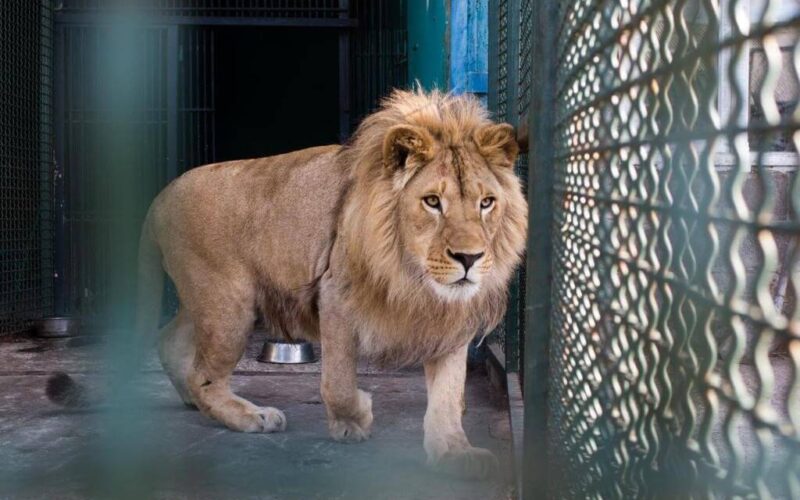Transporting animals by air requires a particular set of skills and means. From pet dogs to racing horses and even sharks, they each come with requirements specific to keeping these unique passengers safe and sound. Wild animals in particular demand higher security and procedural requirements.
On October 26, 2021, KlasJet had the difficult task of transporting two very big cats, Simba the lion, and Eve the leopard. The two animals had to fly from Chelyabinsk, in west-central Russia, to the city of Moshi, in northern Tanzania. They were both awaited by the Kilimanjaro Animal Center for Rescue, Education, and Wildlife (CREW), an animal haven located on the southern slopes of Mount Kilimanjaro.
Two rescued wild cats

(Credit: Klasjet)
Today, Simba the lion is majestic, but he hides a terrible story. In 2020, the animal was found in a barn of Daghestan, starved and mistreated. The cub had been snatched from its mother by unscrupulous men, who proceeded to take the animal to the beaches of Sotchi during the summer to sell selfies to tourists. In order for Simba not to run away, one of his abductors broke his legs.
Fortunately, Simba was rescued by volunteers of the animal rights group Friends of My Heart, founded by Yulia Agaeva. For months, Russian veterinarian Karen Dallakyan and her team provided medical care to Simba and worked towards his rehabilitation at the ‘Save Me’ animal shelter in Chelyabinsk. Meanwhile, the Russian government opened a criminal investigation, which ended in the photographer being sentenced for animal cruelty.
Eva’s journey to salvation was brighter. The Amur and Persian leopard hybrid was rejected by her mother after birth, at which point she was recovered by Dr. Dallakyan and treated until she could be repatriated.
In order to make sure the animals were properly cared for during the entirety of the flight, they were transported inside the cabin of KlasJet’s Boeing 737-522, registered LY-JMS.
While this operation was unprecedented for KlasJet, CEO Rita Domkute told AeroTime that it is the nature of business aviation to adapt to unusual situations.
“We have catered for entertainers, celebrities, high-net-worth individuals, business leaders, and heads of state,” Domkute explained. “Having the King of the Jungle onboard is just more opportunity to demonstrate our flexibility and attention to detail.”
However this time, the priority for KlasJet was not a set of unique catering requests from its exclusive passengers. Rather, the charter carrier’s prime concern was to make sure that no one would become (big) cat food.
A very special flight

(Credit: Klasjet)
In order to do so, the luxurious airplane, which can normally transport 64 passengers, was specially reconfigured. The aircraft’s salons were removed to make way for the two cages, and 40 seats were freed to ensure proper distance from the animals was maintained, and allow for an emergency evacuation.
Eva’s cage was assembled outside the aircraft and then loaded, while the final assembly of Simba’s much-larger enclosure had to take place in the cabin.
The 120-kilogram lion and the 42-kg leopard were tranquilized during the entirety of the trip, with two handlers accompanying the animals to ensure that they remained calm and to monitor their wellbeing.
After standard security checks were completed, the cabin crew deplaned, leaving only the flight crew in the closed cockpit to make way for the loading of the two caged felines.
Regular operations continued only after handlers made sure that the animals were both fully tranquilized. Occupants were told not to approach cages closer than 1 meter during the duration of the flight.
The first leg of the trip took the animals from Chelyabinsk (CEK) in Russia to Riyadh King Khalid International Airport (RUH) in Saudi Arabia, before continuing their journey to Kilimanjaro International Airport (JRO), in Tanzania.
The rehabilitation of both Simba and Eve will continue. According to the Russian Copper Company, which sponsored the rescue, the animals will be housed in comfortable enclosures with a free large area for them to roam. “Specialists will be monitoring the cats’ adaptation and life round-the-clock,” the company said in a statement.
(Credit: Klasjet)

